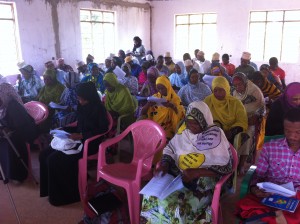“Jambo.” “Karibu.” “Habari gani.” “Rafiki.” “Mzungu.” These are words that I hear on a daily basis walking around the streets of Stone Town. Swahili is the lingua franca here in Zanzibar. While English is the second official language in Tanzania, and many people in Stone Town, at least those involved in the tourism industry or who have a higher level of education, do speak English, everyone prefers to speak Swahili. Once you leave the city or the tourist areas, Swahili is the only language spoken.
Swahili actually originated in Zanzibar, and was spread throughout much of Eastern Africa from here through trading. It is now one of the official languages in Tanzania and Kenya and is spoken from southern Somalia to Uganda, Rwanda, Burundi and into the Democratic Republic of the Congo as well as bits of Zambia, Mozambique, Madagascar and the Comoros. Swahili is at its basis, a tribal language related to the Bantu language group, but it has been influenced by the diverse history of Zanzibar. Persian, English and Portuguese words are incorporated into the language, often slightly altered from their initial version. French fries (chips) are a common street food here, deliciously served topped with salad, often a meat skewer and spicy sauces, and are called “chipsi”. The months are “Septemba, Octoba, Novemba.” The police are “polisi” and a school is “sculi.” Law is “sheria”, although it has nothing to do with sharia law.
Coming from my background as a Peace Corps volunteer, and my experience living and traveling in Latin American countries, where there is no language barrier for me, it has been extremely frustrating and limiting for me not to be able to communicate with local people. We have made two trips to the field now as part of my work, to Pemba and to Makunduchi, a small village on the very southern tip of Zanzibar. During these trips we ran or participated in meetings and trainings, but everything was conducted in Swahili, so the most I could do was pick up bits and pieces based on visual clues, context, and the occasional English word that was dropped throughout the presentation. This has put up a large barrier for me on a personal level, as I want to be able to communicate with local people and not just rely on those involved in the tourism industry, who are often trying to sell me things, or expats for my social interactions. I know that Swahili is not required for my job, I can do my work successfully just in English as I am primarily working on reporting, which is done exclusively in English, but from a personal level, if I am going to spend six months living on this island, I want to be able to communicate comfortably, in the way I am able to in Latin America.
I bought some language CDs which I have been studying at home, but this hasn’t been very successful. So I decided I needed to find myself a tutor to help me out with the language. There is a young man that always hangs out on my doorstep and who I have become very friendly with, named Awadh, and we have been having conversations about music and about life on Zanzibar. I just contracted him to become my informal Swahili tutor. He has been quite persistent about wanting to hang out with me all of the time, and the other day he was talking about the need to find a job to help support his family, so I am going to pay him a small amount to give me lessons 2-3 days a week. Additionally, my co-worker, set me up with a Swahili instructor at the local university, Shani, to give me private lessons. She is also the Spanish teacher at the university and I will help her with her students who are learning Spanish. I’m hoping to not feel like such a mzungu (European, used for white people and tourists in general. It has the same meaning and connotation as gringo in Latin America).
Swahili is a beautiful language and has a very warm tone and rhythm to it. The construction of the language seems fairly straightforward (from what I’ve learned so far) and the sounds of the letters are very similar to English, with the exception of the vowels which have the same sounds as Spanish. I think with a little bit of practice, Swahili should be relatively easy to learn. The main difficulty however is that, much like Guaraní, with the exception of words that come from English, Swahili is not connected to any root language (such as Latin) that can serve as a basis for understanding the words. To start out, I will just have to memorize words and sounds. Then as I begin to have a better understanding, I will be able to put them together and make sense out of the language. It will be difficult, but I think with the help of Awadh and Shani and constantly practicing with people when I can, I will be able to have a decent grasp of the language after my six months here.




